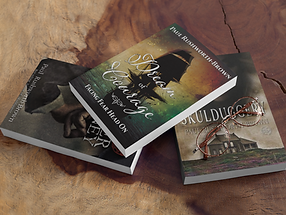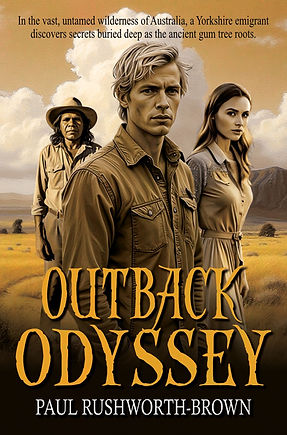
When the Messenger Doesn’t Match the Message
By Amanda Smith https://www.linkedin.com/in/amanda-smith-b3b828272/?lipi=urn%3Ali%3Apage%3Ad_flagship3_pulse_read%3BQR5ChHkPRx60qq%2Ban11OCw%3D%3 Why Paul Rushworth-Brown’s Outback Odyssey is the story Australia needs, whether we’re ready or not - By Amanda Smith in association with the author. When the Messenger Doesn’t Match the Message! In a country built on story, it’s telling how often we still judge the storyteller. Outback Odyssey is a novel that has gained international acclaim. The Associated Press has featured it, covered in the New York National Times , Book Publishing Today and is currently under consideration for a screen adaptation by Swedish director Carl Svensson. Yet in Australia, it has been largely met with silence. The novel is a richly layered work of historical fiction, set in the sweeping expanse of 1950s outback Victoria. At its heart is a young Yorkshire orphan, adrift and searching for belonging, who is taken in by a First Nations Mob. What unfolds is more than a bush adventure or a love story; it’s an allegory of migration, memory, and the long road to truth-telling and reconciliation. These are the same questions Australia still struggles with today, especially in the shadow of the Voice referendum. The real Jimmy Brown — the inspiration behind Outback Odyssey So why has it struggled to gain traction here? Because Paul Rushworth-Brown, the man behind the story, does not fit the image of who Australian media expects to be telling it. Paul is a white, working-class, British-born Australian. He grew up in a council house in Yorkshire, surrounded by poverty, alcoholism, and domestic violence. He entered foster care when his father returned to Australia. His younger brother was adopted out and disappeared from his life for nearly four decades. At eighteen, Paul came to Australia in search of reconnection and something more. That’s not fiction. That’s foundation. His journey shaped both the man and the novel. He hitchhiked through the outback, worked as a navvy replacing railway lines near Hughenden, Queensland, under the searing sun, slept rough, was mugged while camped in the Todd River, and once refused to leave a Darwin pub that wouldn’t serve his Aboriginal friend. He was thrown down a flight of stairs for standing his ground. That history wasn’t romantic. It was real. "My donga on the edge of the outback—tin roof, red dust, and sky for miles. Life was simple, the work was hard, and the silence was loud.” "The heat escalated so fiercely that the water in the hoses would bubble, making it too scalding to wash until nightfall. Flies swarmed thick as smoke; by the time you lifted your sandwich, fifty had claimed their spot. We rose in darkness, working from four, sustained by woodstove meals and the flicker of paraffin flame. I worked alongside hard men who asked no questions and offered no favours. They didn’t care where I’d come from, only that I pulled my weight. Out there, you either adapted… or copped a hiding." “They dropped me in the middle of nowhere, just heat, dust, and horizon. Beneath a lone tree, an Aboriginal man sat. We couldn’t speak the same language, but I sat with him on a piece of cardboard. No words were needed. In that silence, something passed between us, old as the land, gentle as trust.” Hitchhiking with nothing but a pack, a dripper and a promise But this is more than a personal account. Today, Paul is a high school teacher in New South Wales. He teaches Aboriginal studies. He served on the Aboriginal Education Committee at his school. He has spent months living in regional and remote communities, listening and learning. He does not claim to speak for others, but walks with those who have shaped his understanding of the land and its people. Standing on the edge of Arnhem Land, taking in the vast, untouched landscape that speaks more in its silence than words ever could. Paul does not match the expected profile of a writer tackling issues of Aboriginal culture and national identity. But that expectation is part of the problem. In focusing so narrowly on who is permitted to tell these stories, we risk missing those who are telling them with care, depth, and respect. In the vast, rugged landscape, a solitary figure stands in silence, embracing the serenity and wisdom of nature, allowing the land's quiet whispers to speak volumes. Outback Odyssey does not attempt to speak on behalf of First Nations communities. It seeks instead to acknowledge, to reflect, and to bear witness. It is fiction grounded in reality and shaped by years of humility, lived experience, and thoughtful engagement. The hesitation around Paul’s work is not just about content. It is about who is delivering it. This reveals a deeper discomfort that still runs through our literary and cultural spaces. Sometimes, the most important stories come from voices we do not expect. This year’s NAIDOC Week theme, “The Next Generation: Strength, Vision and Legacy,” encourages us to recognise those who have walked a long road to understanding. Paul is one of those voices. He did not write this book for recognition. He wrote it because he had lived it — and because those who shaped him deserve to be remembered. Let’s be honest: If a university-affiliated academic or inner-city literary darling had written Outback Odyssey, it would already be on the shelves at Readings and longlisted for national awards. But Paul Rushworth-Brown isn’t from that world. He’s a white, working-class, English-born migrant — a teacher, a navvy, a man who’s lived in the outback, not theorised about it. That makes some gatekeepers uncomfortable. Sometimes, the most important stories come from voices we don’t expect But here’s the irony: The very reasons some may dismiss him are the reasons Outback Odyssey matters. Because it wasn’t written from a distance. It was written from the red dirt up. Maybe it’s time we listened. About the Author: Paul Rushworth-Brown is an English-born Australian author of four historical novels, including Outback Odyssey. A former sports journalist, national Australian football coach, and current high school teacher, he brings lived experience and a deep respect for Australian history to his work. Outback Odyssey was published in the U.S. by Historium Press, featured by the Associated Press and T he New York National Times , and is currently under consideration for screen adaptation. Paul lives and teaches in New South Wales. 📘 Outback Odyssey by Paul Rushworth-Brown Published by Historium Press | Available now in the U.S. and Australia 🛒 | 🎬 Currently under review for screen adaptation Sometimes the stories we’re told about Australia aren’t the full story. This one dares to listen. Outback Odyssey by Paul Rushworth-Brown is a historical fiction novel set in 1950s Australia, exploring themes of identity, cultural reconciliation, and the human connection to the land. Plot Overview: The story follows Jimmy, a young Yorkshireman who emigrates to Australia under the Big Brother Movement scheme. Assigned to a remote sheep station, he works alongside Aboriginal stockmen, including the Munarrakalai people, who teach him survival skills and share their deep connection to the land. As Jimmy adapts to the harsh realities of the outback, he becomes intrigued by the legend of Wiberg’s Gold—a treasure lost during the 1877 SS Avoca gold heist. His quest to uncover the truth about the gold becomes a journey of self-discovery and cultural understanding. Belonging and Identity: Jimmy's transformation from an outsider to someone who respects and understands the land and its people reflects the broader narrative of integration and the nation's effort to incorporate First Nations' perspectives into its identity. Reconciliation and Cultural Exchange: Through his relationship with Aboriginal mentors, the novel addresses the journey of reconciliation, portraying interactions with sensitivity and nuance, and recognising both the trauma of colonisation and the potential for shared understanding. Nature as a Living Character: The Australian outback is depicted not just as a backdrop but as an active force—a character with moods, secrets, and a spiritual voice, challenging Jimmy’s notions of survival and progress. Masculinity and Vulnerability: Jimmy’s arc redefines masculinity in a harsh environment, showing that strength can be found in openness and respect for others. Reception: Outback Odyssey has been praised for its richly textured storytelling and respectful portrayal of Indigenous cultures. It engages directly with themes of land rights, cultural preservation, and healing—issues still urgent in contemporary Australia. The novel functions as both a gripping historical narrative and a call to empathy and understanding. For readers interested in historical fiction that delves into Australia's complex history and the journey toward reconciliation, Outback Odyssey offers a compelling and thought-provoking narrative.





.png)

.png)


.png)
.png)



.png)


